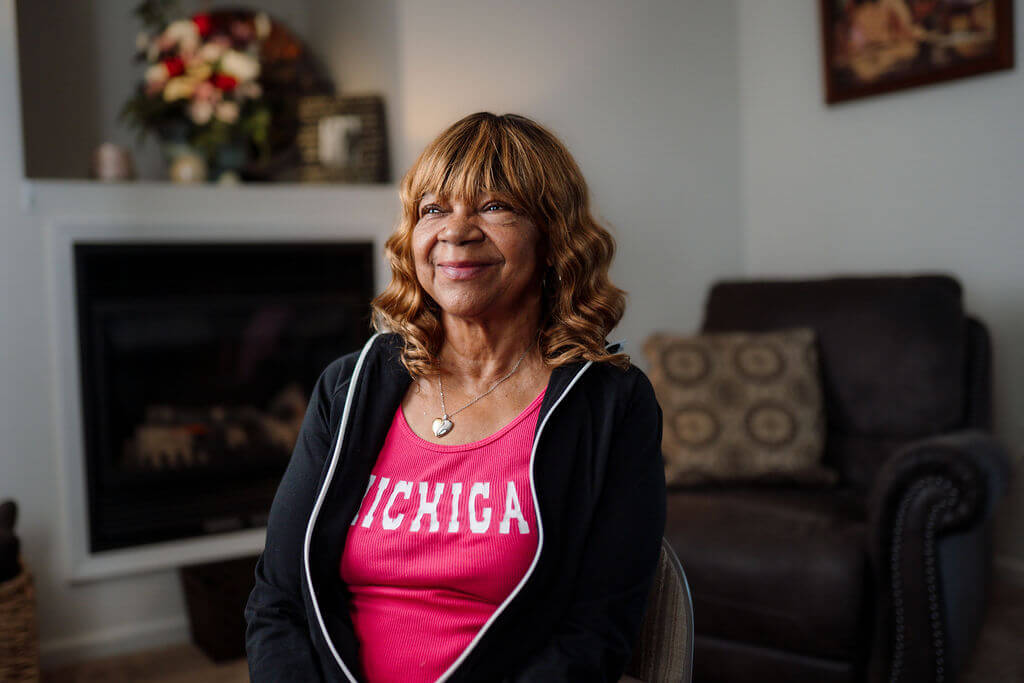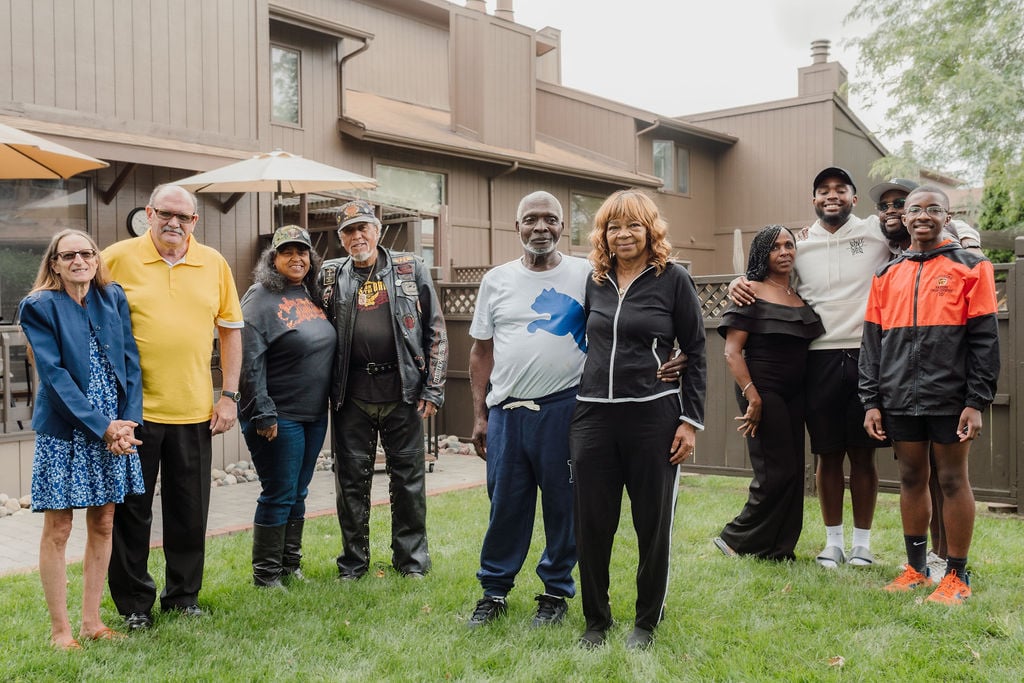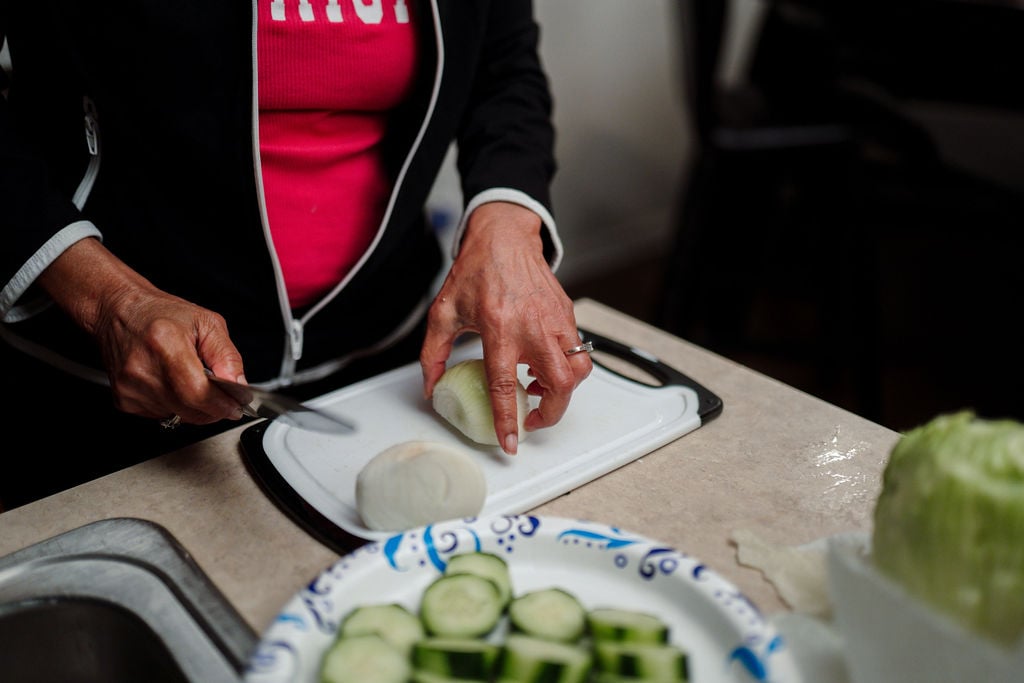After a Preemptive Transplant, a New Lease on Life
Mary Johnson was stunned to learn she had chronic kidney disease. After her diagnosis, she worked with Interwell Health for almost two years to delay kidney failure and avoid dialysis while she waited for a successful transplant.

Sitting at a patio table on a recent crisp September afternoon in Flint, Michigan, 72-year-old Mary Johnson looks out over her grandson’s backyard. It was full of friends and family – eating, laughing, and swapping stories over plates of grilled chicken and vegetables.
Though the close-knit group gets together often, this was no ordinary gathering. They were here to celebrate the first anniversary of Mary’s successful kidney transplant.
Life interrupted
For Mary, intermittent fatigue was the first sign that something was wrong. “I thought I was having problems as part of my diabetes,” she said. Gradually, her blood pressure started to rise. “My blood pressure would not stabilize. It wouldn’t go down.”
She visited her family doctor, and there, in the exam room, he delivered the news: She had stage 3 chronic kidney disease (CKD).
Mary was stunned. She was one of the millions of Americans unaware that they are suffering from CKD, which can be caused by uncontrolled hypertension or diabetes and is often asymptomatic. “I didn’t know that I had kidney disease – I thought I was okay,” she recalled.
Her family doctor referred her to a nephrologist who swiftly mapped out next steps: Mary would need to have her kidney function monitored and she’d have to make immediate changes to protect her kidneys from incurring more damage.
Warmth, creativity, kindness – and personal touch
Mary grew up in California and moved to Flint, Michigan, when she was 28. That’s where she met her husband, Franklin. “As soon as I saw her, I knew I had to find the courage to talk to her,” Franklin said. Mary laughed at his story – “it’s true,” she confirmed.
Mary and Franklin filled their life with community, faith, quiet moments, and family (they have eight children, 13 grandchildren, and six great-grandchildren). “We’re always celebrating birthdays,” Mary joked. “But I have to write them down because I can’t remember them all.”
When I met with Interwell, they made me feel comfortable. I trusted them.

Family and friends universally describe Mary as warm-hearted, creative, and unfailingly kind. She paints and draws. She spends time in nature. She arranges flowers. She makes meals for visitors. And, while doing all this and much more, she manages to make each person in her life feel special and cared for. “She gives a lot of love to the people around her and every person she talks to and touches,” explained her daughter Demetra Scott.
Holistic kidney care
As Mary approached stage 4 of CKD, her nephrologist referred her to Henry Ford Hospital in Detroit where she was added to the kidney transplant list. He also connected her with Interwell Health, which had a partnership with Mary’s health plan.
Interwell approaches kidney care holistically, using multidisciplinary care teams and services to treat the whole person, not just the disease.
To accomplish this, patients are paired with a dedicated nurse care manager and coordinator who works with them to manage all aspects of their kidney disease. Patients are also connected to a holistic team of social workers, nurses, dietitians, and pharmacists who can assist with various supportive efforts – from reviewing prescriptions to arranging transportation and advising on diet and lifestyle changes.
During her first phone call with Keisha Ventura, a nurse and Interwell CKD care manager, Mary knew she was in good hands. “I was scared,” she reflected. “I didn’t know what to do. But when I met with Interwell, they made me feel comfortable. I trusted them.”
Keisha listened closely to Mary’s concerns and goals. “Trust is so important when I’m working with patients,” she explained. “I try to build rapport so we can have these hard conversations.”
Adopting a kidney-friendly diet
Keisha aimed to keep Mary as healthy as possible and out of the hospital.
She connected Mary with a dietitian who could help her change her habits and adopt a more kidney-friendly diet. “I wanted to make sure Mary was eating the right food and avoiding foods that could damage her kidneys,” Keisha said.
“I didn’t know how to eat at first,” Mary explained. “I thought I could eat everything. My dietitian taught me how to eat for my kidneys and diabetes.”

She learned to practice portion control and prioritize whole grains, fruits, vegetables, and lean proteins. And if she wanted more flavor, she’d skip the salt in favor of herbs and spices like cumin and paprika.
These changed eating habits, as well as weekly walks with Franklin in her local park, improved her health and wellbeing and helped stabilize her blood sugar and kidney function.
“Once you have the tools to eat healthy, you can’t go back. It doesn’t feel good anymore – your body just doesn’t feel right,” Mary said.
Addressing the psychological toll of kidney disease A kidney disease diagnosis can take a significant toll on mental health. Research shows patients with both late-stage CKD and ESKD are especially vulnerable to depression and anxiety. Mary was no exception.
“My diagnosis was a storm in my life. I was used to being in control, and then I wasn’t in control anymore because of my health. It was scary. Depression set in,” she reflected.
It’s common for patients to feel overwhelmed, Keisha said. “Kidney disease can be an emotional journey. We referred Mary to our social work team and made sure to give her positive reinforcement. We wanted her to know that we were there for her.”
This support buoyed Mary. “Keisha always showed me she cared. I could ask her anything. I felt comfortable with her, trusted her, and even cried with her. She encouraged me to never give up and showed me how to get through this storm.”
‘Something was changing’
Mary worked with Keisha and the Interwell team for almost two years to stave off kidney failure and delay dialysis.
Though she was taking effective preventative measures, Keisha explained that eventually, her kidney function may decline to the point that she would need dialysis.
Keisha worked closely with her to show what this transition would look like. “When I first brought up the topic of dialysis, Mary was hesitant – so I made sure she got the appropriate dialysis education at her preferred pace,” Keisha said.
As time went on Mary’s condition eventually worsened. She no longer had the energy to walk long distances or participate in activities, spending most of her time at home “moving from the chair to the bed.” It was clear she was approaching end-stage kidney disease (ESKD) and would need to start dialysis soon.
“You could hear in Mary’s voice that something was changing,” Keisha said. “We didn’t want her to crash into dialysis, so our contact became more frequent, and we started to transition her, making sure she had the referrals to specialists and education she needed along the way.”
A preemptive transplant
With Keisha’s guidance about all her treatment options, Mary decided she wanted to undergo peritoneal dialysis at home. Peritoneal dialysis has several potential benefits: It’s convenient, easier on the body, and can maximize quality of life and independence. She was scheduled to have a PD catheter inserted and begin training on home dialysis.
But that surgery never happened. The day before the appointment, Mary received the call she had been waiting two years for: A donor kidney was available. She and her husband jumped in their car and rushed to Henry Ford Hospital in Detroit, where she underwent successful transplant surgery.
Life is just beginning
Mary still remembers something Keisha said during one of the most challenging moments of her illness. “Keisha told me, ‘It’s going to be okay, don’t just think your life is over.’ And even on days when I felt like I couldn’t make it, I would hear her words in my head, and I’d keep pushing.”
Keisha was right. Post-transplant, Mary feels like her life is just beginning. Each day brings a host of gifts: Renewed energy to do what she loves, more time to watch her grandchildren grow. She doesn’t take any of it for granted. “I’m enjoying every little thing,” she said. “Every day is a wonder and a miracle.”